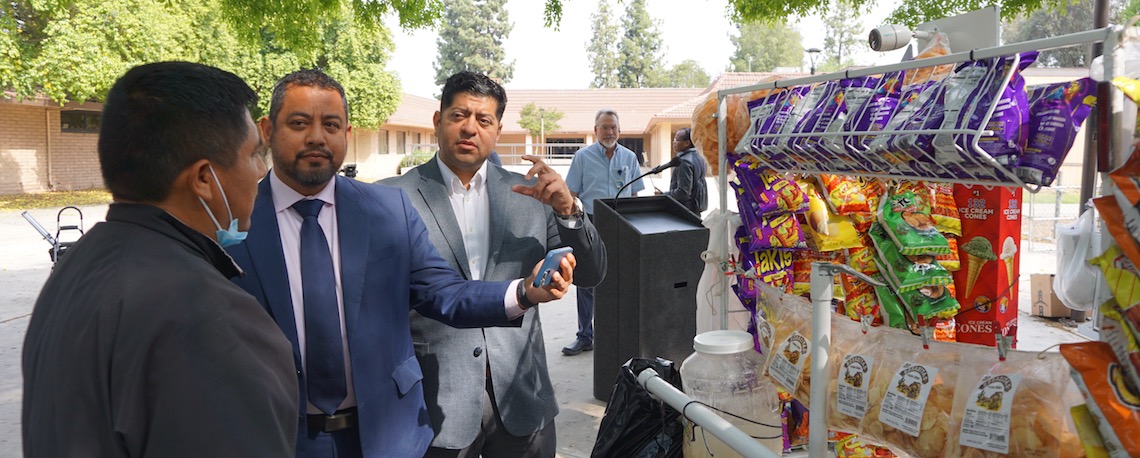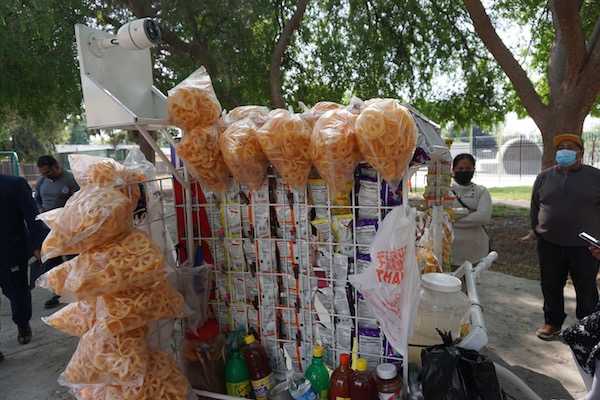
Miguel Lopez, president of the Mobile Food Vendor Association, speaks with Fresno Councilmembers Miguel Arias and Luis Chavez in March 2022. Photos by Edward Smith
Written by Edward Smith
In an effort to address crimes against mobile food vendors, the City of Fresno has undertaken a $20,000 pilot program to provide web streaming video cameras to food cart operators.
On the anniversary of a homicide against a food cart owner, volunteers from the Iron Workers Local 155 mounted the first cameras on the carts of three “eloteros” — corn vendors — in order to provide security to business owners. The City of Fresno will fund the cameras and one year of internet service for those cameras to 20 cart owners who operate in southeast and southwest Fresno. The cost for each camera and a year of service is around $1,000. Funding is being provided out of the budgets for Fresno City Councilmembers Luis Chavez and Miguel Arias.

The camera feed is backed up to a cloud system to the phones or other devices of cart operators. This will serve to not only help police catch criminals who assault or steal from food vendors, but also help prevent crimes, said Arias.
Miguel Lopez, president of the Mobile Food Vendor Association, explained to Arias that in the first day of use, when he was serving food outside a high school, students noticed the camera and immediately began behaving.
In the past year, a lot of operators have been victims of crimes, said Lopez. Two people have been killed and others have been attacked or robbed.
Lopez said the cameras will help them feel more secure as they work.
In the past, food vendors were afraid to go to the police or to the City. Officials would often make them throw away their goods, Lopez said. He said now, the City has been more accommodating. And with the support of police and the community, he and other vendors feel safer.
“If you plan on assaulting or stealing from mobile food vendors, expect to be caught on camera,” said Arias.
Members of the Iron Workers Local 155 volunteered their work to fabricate the mounting systems for the cameras and weld them to the carts.
Part of the pilot program includes figuring out how to best angle the cameras as well as the effectiveness of the cloud back-up system. Chavez estimates that there are 200 or so mobile cart businesses. He said he wanted to see a program be extended to all eligible businesses within City limits as part of the ongoing budget.
Councilmember Luis Chavez called the camera grants the first phase of reaching out and making food vendors feel more comfortable. The second phase is helping them receive small business loans and business support. In order to receive the camera, as well as other support, mobile food vendors need to have proper licensing and inspections from the Fresno County Department of Health.
Chavez said many brick-and-mortar businesses received aid throughout the pandemic. But when foot traffic came to a halt following shutdowns, food vendors were oftentimes left without a source of income.
The City of Fresno has dedicated $5 million to creating a “one-stop shop” for mobile food vendors, providing kitchen space and also a place to file a business license.
Six months ago at the Mosqueda Community Center, the first meeting of the Mobile Food Vendor Association was held. There, 80 or so business owners discussed what they needed the most. Many wanted cameras, Arias said.
“We don’t want any more deaths,” Lopez said in Spanish. “We have to speak up.”







